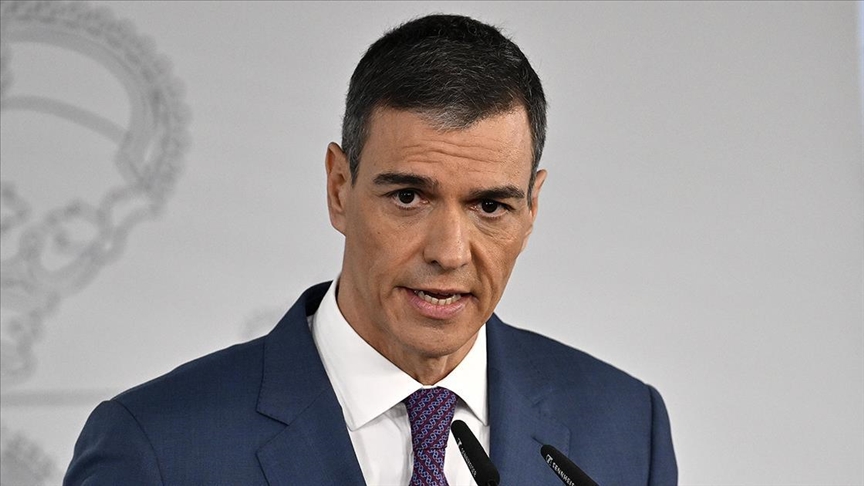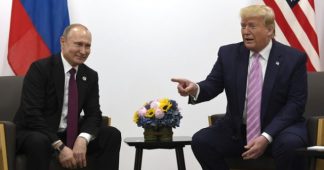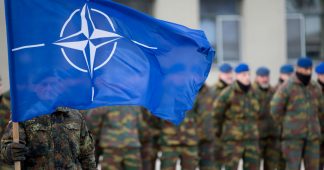Avery Lotz
Jun 25, 2025
President Trump on Wednesday applauded NATO allies’ increased defense spending target, patting himself on the back for a “monumental win” for the U.S. — and lambasting Spain for negotiating an exemption.
The big picture: Trump has long demanded that NATO members to commit more to defense spending and for years criticized nations that did not reach the prior 2% benchmark.
- During a particularly inflammatory moment on the 2024 campaign trail, Trump claimed he had told the leader of an unidentified NATO member that he would “encourage” Russia “to do whatever the hell they want” to that NATO nation if it were behind on its defense obligations.
Context: NATO leaders on Wednesday released the alliance’s hiked spending target, in which allies pledged to invest 5% of gross domestic product on defense by 2035.
- Spain reached a deal with NATO ahead of the summit to be excluded from the new goal but would maintain its commitment to the alliance by spending 2.1% of GDP on defense, the Associated Press reported.
What he’s saying: Trump threatened to make Spain “pay twice as much” amid trade negotiations.
- “I think Spain is terrible, what they’ve done,” Trump said at a press conference ahead of his scheduled departure from the NATO summit.
- “You’re the only country that is not paying. I don’t know what the problem is,” he said to a reporter who identified themselves as being from Spain.
- Trump later said he’d negotiate “directly with Spain.”
Catch up quick: Spain is part of the European Union, which is negotiating with Washington ahead of a tariff deadline looming in about two weeks.
- Trump signaled a stubborn standoff with the EU last month, writing on Truth Social that he recommends a straight 50% tariff on EU goods. He later pressed pause on that threat until July 9.
By the numbers: A declaration from the alliance about the hiked budget points to the “long-term threat posed by Russia to Euro-Atlantic security” and the threat of terrorism.
- The 5% goal is made up of “at least” 3.5% for “core” defense requirements. Allies agreed to submit “annual plans showing a credible, incremental path to reach this goal.”
- Up to 1.5% is meant to protect infrastructure, defend networks, ensure “our civil preparedness and resilience, unleash innovation, and strengthen our defence industrial base.”
Zoom out: The president has long aired grievances against NATO, arguing the U.S. was being ripped off.
- But upon his departure from a summit where he said other world leaders were “so respectful of me,” he expressed a softer view.
- “I came here because it was something I’m supposed to be doing, but I left here a little bit different,” he said, adding the “love and the passion” members showed for their countries was “unbelievable.”
- “They want to protect their country, and they need the United States,” he said.
.
Keep reading at axios.com
Spain to meet new capabilities targets agreed to by NATO members: Premier
NATO states pledged to allocate 5% of GDP annually by 2035 to meet both core defense requirements and broader security needs at end of The Hague Summit
Jun 25, 2025 – Update : 26.06.2025
 Spanish Prime Minister Pedro Sanchez
Spanish Prime Minister Pedro Sanchez
Spanish Prime Minister Pedro Sanchez asserted his country’s steadfast commitment to meeting the new capabilities targets agreed on by NATO members while pushing back against doubts over Madrid’s defense budget.
“Spain will comply with the agreed-upon capabilities in a timely manner, as we have always done,” Sanchez said Wednesday at a press briefing in The Hague, emphasizing that the country is “a serious nation that honors its commitments.”
He said Spain is advancing with its national industrial and technological plan for security and defense, which targets reaching 2% of GDP in military spending by 2029.
“This investment is not only realistic and sufficient—it’s also compatible with our social model, the welfare state, and our international obligations,” he said.
Spain’s position, he stressed, goes beyond percentages.
“The key is not how much we spend, but what capabilities we bring to the table to meet the challenges we face as an alliance,” he noted.
The Defense Ministry and Spanish Armed Forces have determined that the 2.1% budget goal is aligned with the technical and human capabilities agreed upon within NATO.
Sanchez also underscored Spain’s current role on NATO’s eastern flank, where nearly 3,000 Spanish troops are deployed. He paid tribute to their work, saying their presence “proves the firm and constant nature of Spain’s commitment.”
He welcomed the flexibility that NATO’s final declaration provides to Spain in choosing its path to meet capability goals, quoting NATO Secretary General Mark Rutte: “The declaration we have approved today will give Spain the flexibility to determine its own path to achieving its capabilities targets and to determine the annual resources needed as a percentage of gross domestic product.”
Sanchez’s remarks came after NATO member states committed Wednesday to a significant increase in defense spending, pledging to allocate 5% of GDP annually by 2035 to meet both core defense requirements and broader security needs.
US President Donald Trump lashed out at Spain on Wednesday for refusing to back NATO’s newly adopted defense spending targets, warning that the country could face punitive trade measures as a result.
Speaking at the NATO summit in The Hague, Trump criticized Madrid for rejecting the alliance’s call for members to allocate 5% of their GDP to defense.
“You’re the only country that is not paying. I don’t know what the problem is,” Trump said when asked about Spain’s position. “We’ll make it up. You know, we’re going to do, we’re negotiating with Spain on a trade deal. We’re going to make them pay twice as much. And I’m actually serious about that.”
Spain, a member of both NATO and the European Union, is caught in the middle as the EU races to finalize a trade agreement with Washington before tariffs on nearly all its exports to the US rise to 50% on July 9. While Trump suggested bilateral negotiations with Spain, trade policy for all 27 EU member states is handled by the European Commission, not by individual countries.
Spanish Trade Minister Carlos Cuerpo pushed back against Trump’s threat, emphasizing the collective nature of EU trade talks.
“The European Commission is in charge of negotiations on behalf of all EU countries, not just Spain,” Cuerpo told Spanish news agency EFE. “This negotiation is being made in the EU-US framework.”
In a declaration issued at the end of the NATO summit, the alliance said the investment aims to strengthen deterrence and defense capabilities amid growing security challenges, particularly the “long-term threat” posed by Russia and the persistent danger of terrorism.
“Allies commit to invest 5% of GDP annually on core defense requirements as well as defense-and security-related spending by 2035 to ensure our individual and collective obligations, in accordance with Article 3 of the Washington Treaty,” the declaration said.
The 5% target includes two main components: at least 3.5% of GDP annually for core defense expenditures to meet NATO Capability Targets and up to 1.5% of GDP for areas such as critical infrastructure protection, cybersecurity, civil resilience, innovation and industrial capacity-building.
Keep reading at aa.com.tr/en/
READ ALSO: Spanish Prime Minister Rejects NATO Call to Raise Defense Spending to 5% of GDP
We remind our readers that publication of articles on our site does not mean that we agree with what is written. Our policy is to publish anything which we consider of interest, so as to assist our readers in forming their opinions. Sometimes we even publish articles with which we totally disagree, since we believe it is important for our readers to be informed on as wide a spectrum of views as possible.











